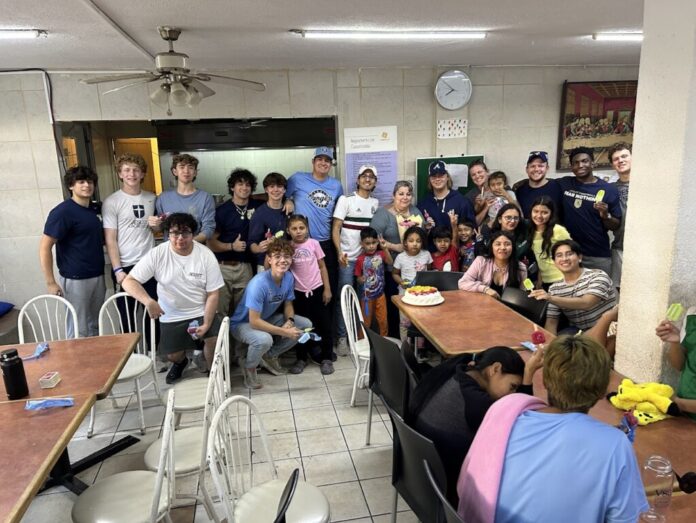Our Mission
On November 21st, the Thursday before Thanksgiving Break, 11 other Jesuit students and I began our journey of solidarity and service in Monterrey, Mexico. Although it was only a five-day trip, it challenged us, myself included, to reexamine our outlook on the marginalized and consider how we could make a meaningful difference in their lives.
Each day, we visited various locations that provided essential services to those less fortunate than ourselves. Among these, one place stood out in particular: La Casa San Nicolas, where we served almost every day.
This trip tested us spiritually, mentally, and physically. It not only transformed our individual perspectives but also profoundly reshaped our worldview to be aware of the challenges of those marginalized in our society.
Finally, as someone who attended the trip in June, I had the opportunity to serve as a student leader on the trip. There were many differences between my experience in June compared to that of November, but both were transformative experiences that continue to shape me today.
The Power of a Smile
As I mentioned earlier, La Casa San Nicolas was central to our service throughout the entirety of our trip. For context, this place serves as an immigrant home for those fleeing oppression or suffering in Latin American countries, including Honduras, El Salvador, Colombia, and Guatemala. It offers not only housing for those seeking refuge but also feeds them, clothes them, and restores their dignity.
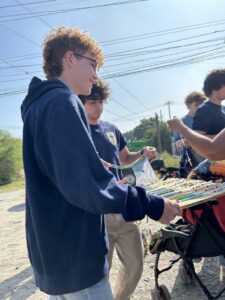
Despite the unimaginable suffering these individuals have endured, they found joy and happiness in our interactions. Whether coloring or playing on the playground, the immigrant children seemed to forget their hardships, replacing the sorrowful void with vibrant bliss.
This is why I named this section “The Power of a Smile.” By simply offering an expression of happiness and connection, these children began to experience something they may have not felt in a very long time: belonging and joy.
Through this trip, I learned that while we may have distinct cultural differences and language barriers, a smile can serve as a universal form of connection and communication. Through smiles my peers and I were able to transcend the barriers presented by our different cultures, which allowed us to form concrete connections with these marginalized children in a matter of minutes.
“Te Veo”
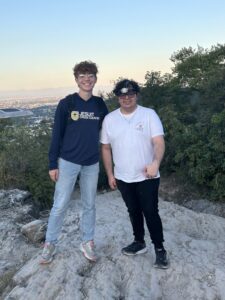
Every morning and night, the 16 of us would gather in the monastery’s common room to reflect. Each reflection focused on a keyword or phrase that encapsulated our mission for the previous day or the day ahead. On the second night, the phrase was “Te Veo.”
Translated to English, this means “I see you.” This phrase, I believe, embodies the purpose of our trip. Our intentions were not to change their situation but to restore and establish a connection with those we encountered. We were challenged to see them amid their suffering and offer dignity, understanding, and compassion.
I saw the children at La Casa San Nicolas, the residents at the nursing home, and those we served at the disabled home. Although I had no prior connection with them, making eye contact allowed me to convey that I understood their situation and saw them as fellow human beings, not merely as “illegal immigrants” often unjustly labeled as “plaguing our society.”
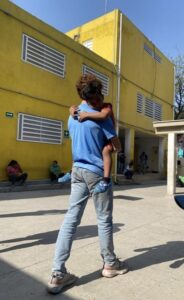
Although I have since returned to the United States, I have tried to embrace this same idea of “Te Veo” in my own life. I have challenged myself to no longer look past the homeless man on the street and instead offer him a smile or even spark a brief conversation before the light turns green.
Embracing the phrase “Te Veo” may have seemed hard while in Monterrey, but incorporating its teachings into my life back home has been even harder. However, I believe this is what God calls us to do. We are challenged by God to embrace the hard aspects of life to spread His love and grace to those less fortunate than ourselves.
Emotional Moments
As I look back on this trip, I feel an ambivalence of emotions. On one hand, I associate joy and happiness with our trip, knowing the impact we made. On the other hand, I am filled with sadness, knowing that people regularly endure suffering and there is almost nothing I can do about it. The overarching uncertainty is crushing. Questions such as “Is that kid I just played with still safe?” and “Is that old man I simply held hands with okay?” remain unanswered every single day.
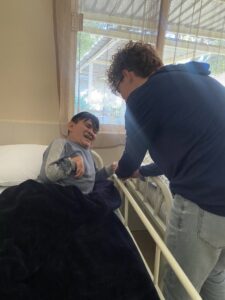
When I traveled to Monterrey in June, I met a man named Pepe. Pepe had been left on the side of a road, forgotten and wounded. He couldn’t speak, was in a wheelchair, and had difficulty with motor functions. Despite these physical limitations, the Pepe I encountered had the biggest and brightest smile I had ever seen. Simply holding his hand, taking him for a walk, and listening to music together elicited the brightest expression of joy I’ve ever witnessed. When I returned this past November, I thought he would have forgotten me, but as soon as he saw me walk through the door, his face lit up, and I couldn’t help but smile in response.
Another memorable encounter was with a child named Daniel. For most of the trip, I didn’t know Daniel’s name or where he was from. Despite this, we formed a strong connection and friendship. One of my fondest memories was lifting Daniel up to dunk on a basketball hoop. As soon as the ball went through the hoop, he erupted with laughter, and it was at that moment I knew I would never forget him.
What I learned
Looking back on my experience, I realized that this journey to Monterrey was not just a trip; it was a profound lesson in kinship and the true essence and power of love. Through my encounters with individuals like Pepe and the immigrants at La Casa San Nicolas, I realized that love and connection transcend physical limitations and cultural differences. Our shared humanity and the small acts of kindness we extend to one another can make an immense difference.
While I was only in Monterrey for 5 days, this experience has forever changed my viewpoint and understanding of kinship, showing me that it is not only limited to our families but extends to the entirety of those we interact with, especially the marginalized.
As we continue in our lives, let us remember the power of these connections and strive to foster them in both our communities and beyond.
Stay tuned to The Roundup for more reflections on Jesuit’s cultural immersion and service trips!


